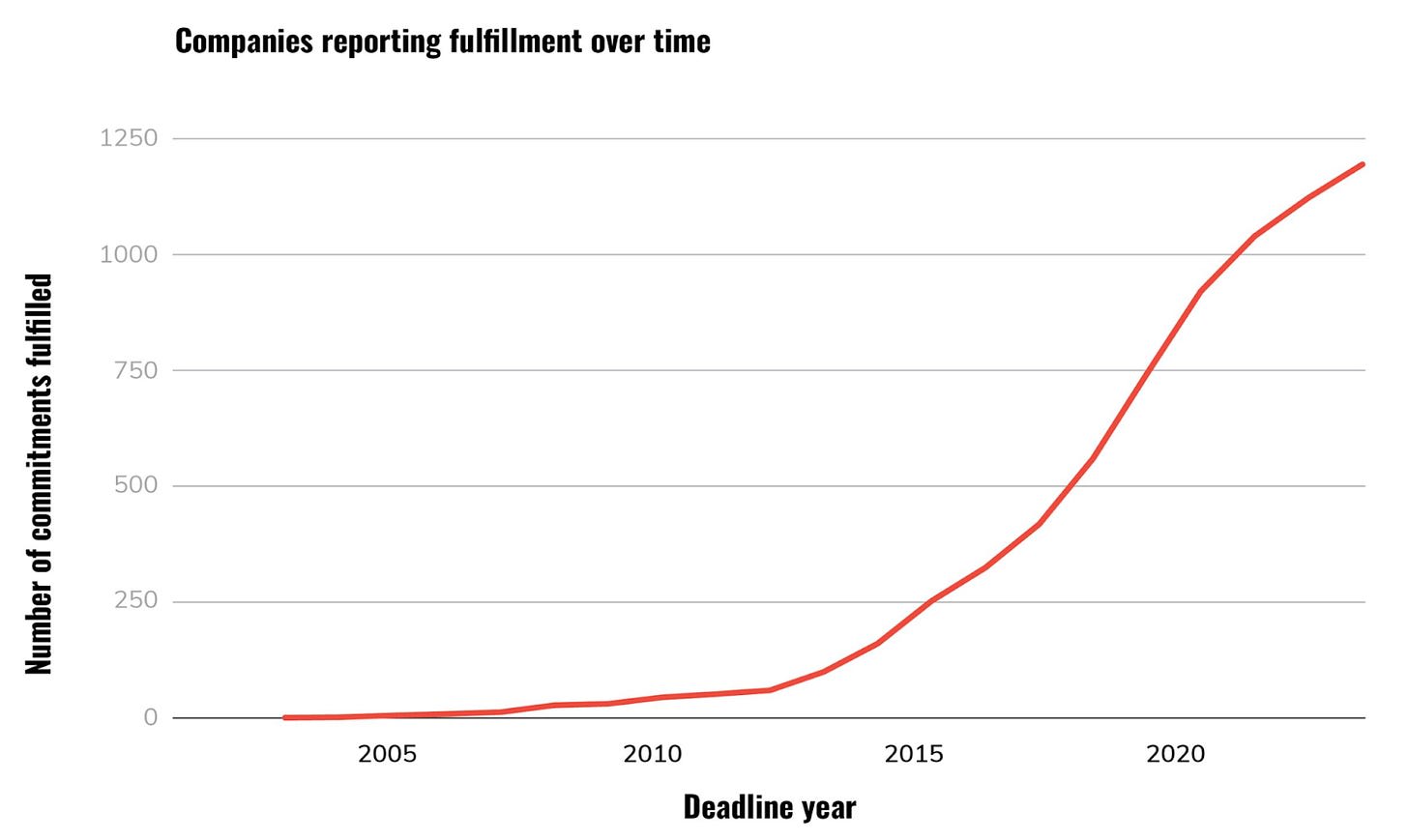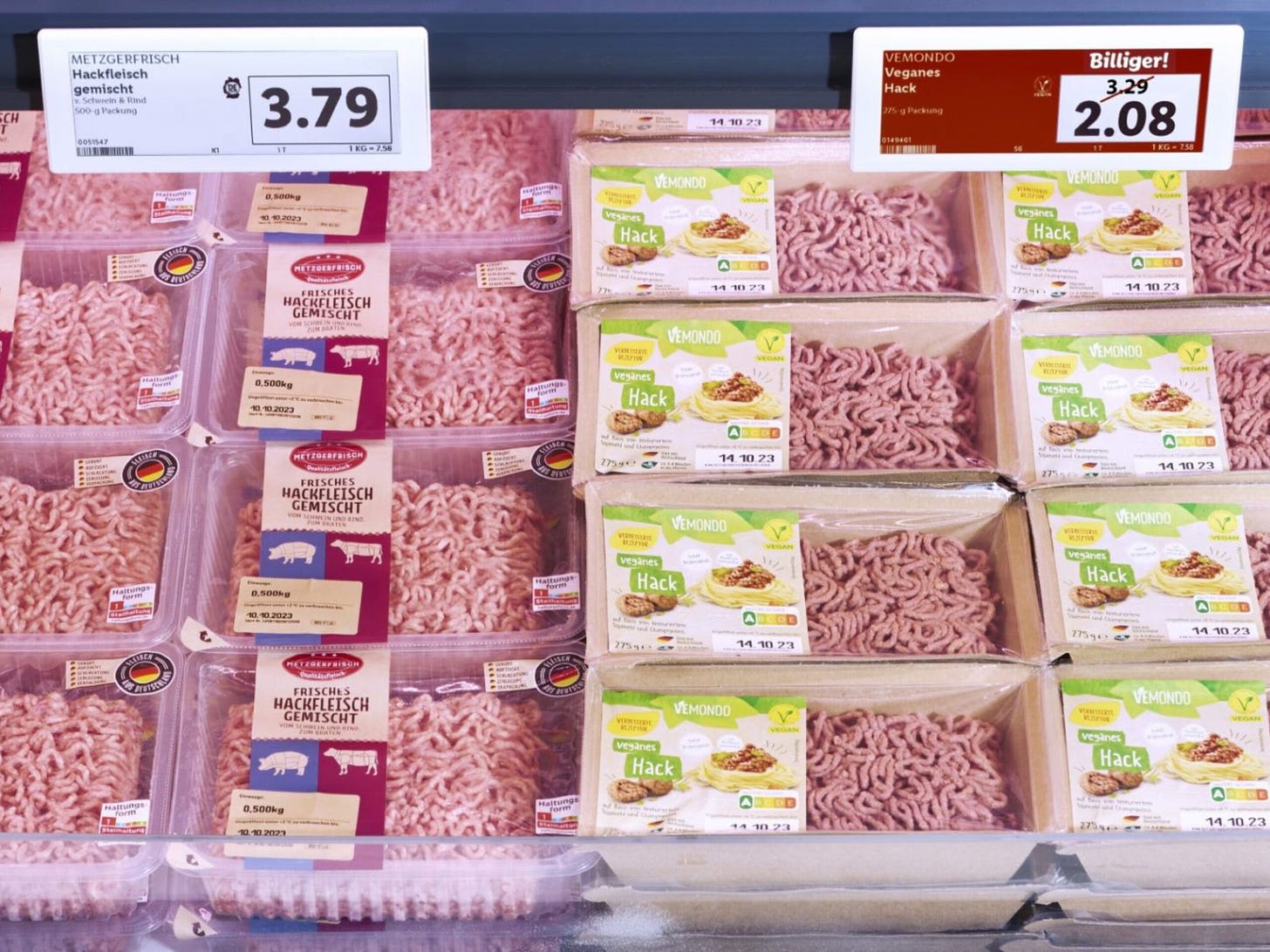Note: This post was crossposted from the Open Philanthropy Farm Animal Welfare Research Newsletter by the Forum team, with the author's permission. The author may not see or respond to comments on this post.
Progress for factory-farmed animals is far too slow. But it is happening. Practices that once seemed permanent — like battery cages and the killing of male chicks — are now on a slow path to extinction. Animals who were once ignored — like fish and even shrimp — are now finally seeing reforms, by the billions.
It’s easy to gloss over such numbers. So, as you read the wins below, I encourage you to consider each of these animals as an individual. A hen no longer confined to a cage, a chick no longer macerated alive, a fish no longer dying a prolonged death.
I also encourage you to reflect on the role you and your fellow advocates and funders played in these wins. I’m inspired by what you’ve achieved. I hope you will be too.
1. About Cluckin’ Time. Over 1,000 companies globally have now fulfilled their pledges to go cage-free. McDonald’s implemented its pledge in the US and Canada two years ahead of schedule, sparing seven million hens from cages. Subway implemented its pledge in Europe, the Middle East, Oceania, and Indonesia. Yum Brands, owner of KFC and Pizza Hut, reported that for 25,000 of its restaurants it is now 90% cage-free. These are not cheap changes: one UK retailer, Lidl, recently invested £1 billion just to transition part of its egg supply chain to free-range.
2. The Egg-sodus: Cracking Open Cages. In five of Europe’s seven biggest egg markets — France, Germany, Italy, the Netherlands, and the UK — at least two-thirds of hens are now cage-free. In the US, about 40% of hens are — up from a mere 6% a decade ago. In Brazil, where large-scale cage-free production didn’t exist a decade ago, about 15% of hens are now cage-free. And in Japan, where it still barely exists, the nation’s largest egg buyer, Kewpie, pledged to help quintuple the nation’s cage-free production. These changes matter: the most comprehensive analysis to date, by the Welfare Footprint Project, suggests that cage-free hens suffer less than half as much as their caged cousins.

Source: The Open Wing Alliance.
3. Roomier Roosts for Half a Billion Birds. Almost all of the UK’s largest retailers, from Tesco to Aldi, pledged to cut crowding for the roughly 350 million chickens in their supply chains. The move, which gives each bird about 20% more space, seems modest. But studies suggest that even this small change can halve rates of footpad lesions, and Sainsbury’s reported that the move had already reduced sickness amongst its birds by 29%. Top four German retailers Rewe and Lidl went further, adopting comprehensive animal welfare reforms — including breed changes — that will improve the lives of about 165 million chickens every year.
4. Hatching Egg-citing Innovations. The number of male chicks killed in European hatcheries has fallen by about a fifth in recent years, as in-ovo sexing has reached 20% market penetration, per new research by Innovate Animal Ag. KAT, which certifies most laying hens in Germany, implemented its ban on chick killing, sparing 80 million chicks annually from the practice. The first US egg producer announced it will soon stop chick killing and, just last week, a US hatchery shared that it has installed the nation’s first in-ovo sexing system.
5. Peas Out, Meat; Soy Long, Dairy. Eleven Dutch supermarkets, which together sell 90% of the nation’s groceries, pledged to increase the share of their protein sales that are plant-based from about 40% today to 60% by 2030. Four of Germany’s largest retailers cut the price of their own-brand plant-based meats to match the price of meat. One of them, Lidl, said vegan product sales spiked 30% after it cut prices and placed plant-based meat alongside its meaty counterpart.

6. Putting Green into Going Green. Governments invested over $200 million into research and infrastructure advancing alternative proteins, including in the US ($71M via DOC, DOD, and Massachusetts), Denmark (DKK 420M / $59M), Japan (¥7.87B / $51M), the UK (£27M / $34M via two grants), the EU (€12M / $13M) and Beijing (80M Yuan / $11M). New alternative protein research centers, funded by the Bezos Earth Fund, opened in London, North Carolina, and Singapore.
7. A New Top Dog for European Animals. The European Commission announced a new Health and Animal Welfare Commissioner — the first time animal welfare has been elevated to this rank. The new Commissioner, Hungarian populist Olivér Várhelyi, promised to deliver on a revision of the EU’s farm animal welfare laws, though he refused to commit to a timeline. Last week, 11 European countries called on the Commission to move forward with the revision.
8. A Constitutional Clause is a Claws for Celebration. Mexico’s Senate and Chamber of Deputies unanimously approved new clauses enshrining animal welfare in the Constitution, and President Claudia Sheinbaum signed them into law. While the clauses don’t mention farmed animals, they empower Mexico’s Congress to pass a general animal welfare law, which advocates hope will protect farmed animals.
9. Trout-standing Progress. The Aquaculture Stewardship Council, one of the world’s largest sustainability certifiers, finalized its new farm standard, which will improve the welfare of an estimated 1.2 billion fish once implemented. The Council will start rolling it out next year. Aqualande, the largest rainbow trout producer in France, committed to using electrical stunning before slaughter on all of its farms, as did another major aquaculture producer.
10. Raising the Bar for Bottom Dwellers. The UK’s two largest retailers, Tesco and Sainsbury’s, adopted two of the world’s first crustacean welfare policies. They pledged to eliminate the creatively barbaric practice of eyestalk ablation and ensure that the perhaps eight billion shrimp in their supply chains are stunned before slaughter. They also pledged to not sell live crabs or lobsters in store.

Against the giant wrongs of factory farming, these wins may appear small. But for the animals affected, they’re a big deal. And they were all achieved by a small group of advocates operating with less funding than Harvard spent renovating a single residential house.
Many of these advocates and funders read this newsletter. So, this holiday season, let me tell you how much I appreciate and admire what you do. You could easily have chosen to ignore the plight of factory-farmed animals, to dismiss their cause as someone else’s problem, and to focus on helping yourself. Most people do.
But you didn’t. You chose to devote your most precious resources — your time and money — to the cause of a group of individuals ignored by most of society. Individuals who you’ll never meet and who will never thank you or even know your name.
Throughout history, small groups of morally courageous people have made the same choice. They’ve challenged atrocities accepted or ignored by society at large. They’ve toiled endlessly in obscurity and quiet despair — until, eventually, they’ve won.
I know our cause can feel endless too. But you made the right choice. Thanks to you, many animals will suffer less and, one day, we too will win. That’s worth being grateful for. Thank you for all you do, and happy holidays.

I notice that one of the UK grants for alernative proteins which you cite says, "Cultured meat, insect-based proteins and proteins made by fermentation" (my emphasis). I find this quite concerning.
I didn't previously realise the term "alternative proteins" includes insects. Has this always been the case? Is the definition contested or is a different term needed?
From the NAPIC website, they include Entocycle, "a world-leading provider of insect farming technology", as one of their partners (though this may not be representative). Interestingly Entocycle do have two pages on insect welfare.
Thanks for flagging that Hugh. I wavered on whether to include that grant given its inclusion of insect-based protein, which I agree is concerning.
Thankfully most alternative protein grants don't include insects. (And, as CB points out, GFI doesn't include insects in their definition.) But the term is increasingly contested, as insect producers -- with the backing of the pet food and aquaculture industries that are their primary customers -- are pushing for alt protein funds to cover them.
Oh, that's a good catch.
Insect based foods tend to apply to alternative protein grants - although the share of the insect market dedicated to meat substitutes is very small. From what I've seen, The Good Food Institute doesn't include insects in their definition of alternative proteins (since, well, they are animal proteins).
It also wouldn't be very strategic to include insects in the list since they perform worse than plant based alternatives from an environmental and, most importantly, acceptability standpoint. I'm on mobile so I don't have a source right now but it was from a Smetana 2023 paper on meat substitutes iirc.
I was pretty positively surprised to read "In Brazil, where large-scale cage-free production didn’t exist a decade ago, about 15% of hens are now cage-free." So I hope I'm wrong about the point below.
To me the article cited seems to instead say just that Mantiqueira, the largest egg producer in Brazil, has almost 15% cage-free production (and will reach 20% with the additional of 3 new cage-free units discussed in the article), not that total Brazilian production is 15% cage-free. (A Bloomberg article suggests the company has 5% organic and 15% "happyEggs" for a total of 20% cage-free production.)
Other sources seem to suggest the total Brazilian hen population is closer to 5% cage-free (e.g., the Latin American Egg Institute says 95% caged referencing 2023 production). Luiz Mazzon, president of the Certified Humane Brasil Institute in an article in May 2024 said “In Brazil, 5% of egg production comes from cage-free or free-range farms", and this 2023 paper says the same thing (95% in conventional cages). Though this is where it was in 2019 (see this 2019 government-associated report) so maybe they're all referencing old data, not that the share of cage-free production hasn't increased at all (though also consistent with cage-free production increasing, just not as much as non-cage free production increased)
It's still great that the largest egg producer reached the 2.5M cage-free hen goal a year and a half ahead of schedule, and doesn't take much away from the genuine progress in cage-free. I assume these statistics above are old data and don't capture some of the progress that's happening and the projected increase in cage-free from the 35 cage-free commitments that have been fulfilled & 56 reporting (according to ChickenWatch). If you (or anyone in Brazil) have another source on the 15% that'd be really encouraging to read.
Thanks Neil. Good catch, and sorry I'm only replying now -- I hadn't checked the Forum over the break. I assumed that the original article was referring to all cage-free production because:
But I think this could be a translation issue. And I don't have any other sources, while the sources you found seem more likely to be accurate. So I suspect you're right that sadly Brazil has made less progress thatn we thought.
Thank you for writing this!
I want to point out that besides the informational value, I find it personally encouraging and heartwarming to read the part where you expressed your appreciation to donors and advocates in the space, and your vision. I think I might learn from you and try doing more of this in some of my writings. Thank you for doing that.
Thanks Fai! Yes I'm trying to express more often the deep appreciation that I feel for the incredible donors and advocates in our space. I'm glad to hear you find it encouraging :)
Great list - Always good to see the stuff that is working and that we can make a difference !
I just wanted to say thank you so much for this newsletter and it's crazy Harvard is spending over $800 million renovating one house